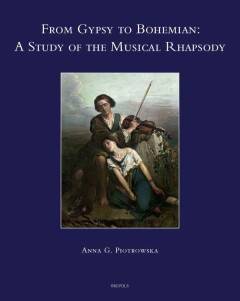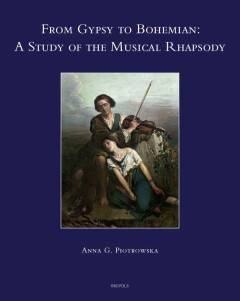
Je cadeautjes zeker op tijd in huis hebben voor de feestdagen? Kom langs in onze winkels en vind het perfecte geschenk!
- Afhalen na 1 uur in een winkel met voorraad
- Gratis thuislevering in België vanaf € 30
- Ruim aanbod met 7 miljoen producten
Je cadeautjes zeker op tijd in huis hebben voor de feestdagen? Kom langs in onze winkels en vind het perfecte geschenk!
- Afhalen na 1 uur in een winkel met voorraad
- Gratis thuislevering in België vanaf € 30
- Ruim aanbod met 7 miljoen producten
Zoeken
€ 121,90
+ 243 punten
Omschrijving
This volume examines the concept of rhapsody through a broad lens. Beginning with a discussion of the meaning(s) of the term itself, it then traces the history and reception of the genre and its significance in European culture. It argues for a close relationship between the idea of rhapsody and the concept of Gypsiness by demonstrating that 'rhapsody' and 'Gypsiness' can be seen as manifestations of the same types of influence and preferences for certain aesthetic categories. The book pays special attention to the seminal role of Franz Liszt in its discussion of the instrumental rhapsody. Ultimately, it reveals the consequences of historiographical representations of the rhapsody (e.g. the ossification of the image of the European Gypsy musician as a bard/rhapsode, the fossilization of presumptions concerning the nature of so-called 'Gypsies') as well as unexpected similarities and differences between the rhapsody and the ballad as romantic genres with national implications. Winner of the 2024 Triennial Alan Walker Book Award
Specificaties
Betrokkenen
- Auteur(s):
- Uitgeverij:
Inhoud
- Aantal bladzijden:
- 247
- Taal:
- Engels
Eigenschappen
- Productcode (EAN):
- 9782503594873
- Verschijningsdatum:
- 20/05/2021
- Uitvoering:
- Hardcover
- Formaat:
- Genaaid
- Gewicht:
- 1460 g

Alleen bij Standaard Boekhandel
+ 243 punten op je klantenkaart van Standaard Boekhandel
Beoordelingen
We publiceren alleen reviews die voldoen aan de voorwaarden voor reviews. Bekijk onze voorwaarden voor reviews.









